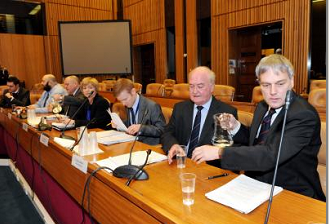The Standards Commission for Scotland has confirmed that a conduct hearing for seven leading politicians at Aberdeen City Council will resume in April, just three weeks before the general election.
The Press and Journal revealed last week that senior members of the Labour-led coalition would be called back before the panel on April 15.
The initial hearing in February was adjourned after the local authority’s former chief executive, Valerie Watts, failed to give evidence via video link as had been expected.
The legal representative for the five Labour councillors – including leader Jenny Laing, finance convener Willie Young and former leader Barney Crockett – objected to the resumption of the hearing during the “purdah” period before the general election on May 7.
Frances Randle, a solicitor from Steel and Shamash working on behalf of the Labour party, specifically asked for it not to take place during the six week pre-election period.
However, the Standards Commission for Scotland has insisted the matter will be dealt with on April 15, with the option of running into April 16 if necessary.
A spokeswoman said yesterday that the date had been set and that a decision would be expected to be taken at the conclusion of proceedings at the town house in Aberdeen.
Any negative publicity from the hearing could prove damaging to Labour, which is fighting to hold on to the Aberdeen North and Aberdeen South seats at Westminster.
It will also come at a bad time for Tory councillor Ross Thomson, who is the Conservative party’s candidate for Aberdeen South.
At the February hearing, the top legal official at the city council said she had warned members they could be breaking the law by sending out pro-Union letters with council tax bills prior to the referendum.
The letter, signed by then leader Mr Crockett, said Aberdeen is “stronger now and will be stronger in the future – economically, politically and socially – as a partner within the United Kingdom”.
The mass mailing went out with 110,000 council tax and 6,500 business rate demands in March last year and prompted a string of complaints from members of the public, opposition councillors and local MSPs.
If found guilty of breaching the Councillors Code of Conduct, the politicians could face a suspension from meetings for up to a year or disqualification for as long as five years.
